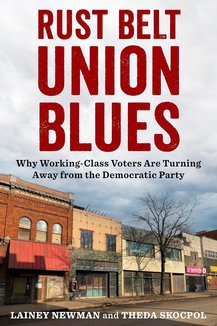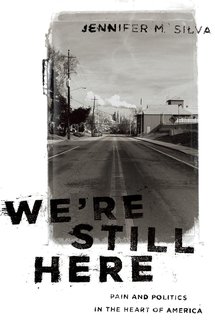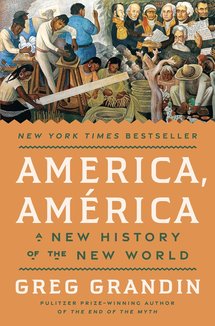Recommended Books

Rust Belt Union Blues: Why Working-Class Voters Are Turning Away from the Democratic Party
Authors:
Theda Skocpol
,
Lainey Newman
ISBN 13:
978-0231208826
In the heyday of American labor, the influence of local unions extended far beyond the workplace. Unions were embedded in tight-knit communities, touching nearly every aspect of the lives of members―mostly men―and their families and neighbors. They conveyed fundamental worldviews, making blue-collar unionists into loyal Democrats who saw the party as on the side of the working man. Today, unions play a much less significant role in American life. In industrial and formerly industrial Rust Belt towns, Republican-leaning groups and outlooks have burgeoned among the kinds of voters who once would have been part of union communities. Lainey Newman and Theda Skocpol provide timely insight into the relationship between the decline of unions and the shift of working-class voters away from Democrats. Drawing on interviews, union newsletters, and ethnographic analysis, they pinpoint the significance of eroding local community ties and identities. Using western Pennsylvania as a case study, Newman and Skocpol argue that union members’ loyalty to Democratic candidates was as much a product of the group identity that unions fostered as it was a response to the Democratic Party’s economic policies. As the social world around organized labor dissipated, conservative institutions like gun clubs, megachurches, and other Republican-leaning groups took its place. Rust Belt Union Blues sheds new light on why so many union members have dramatically changed their party politics. It makes a compelling case that Democrats are unlikely to rebuild credibility in places like western Pennsylvania unless they find new ways to weave themselves into the daily lives of workers and their families.
Find on:
 Amazon
Amazon

We're Still Here: Pain and Politics in the Heart of America
Author:
Jennifer M. Silva
ISBN 13:
978-0197582619
A deep, multi-generational story of pain, place, and politics. The economy has been brutal to American workers for several decades. The chance to give one's children a better life than one's own -- the promise at the heart of the American Dream -- is withering away. While onlookers assume those suffering in marginalized working-class communities will instinctively rise up, the 2016 election threw into sharp relief how little we know about how the working-class translate their grievances into politics. In We're Still Here , Jennifer M. Silva tells a deep, multi-generational story of pain, place, and politics that will endure long after the Trump administration. Drawing on over 100 interviews with black, white, and Latino working-class residents of a declining coal town in Pennsylvania, Silva reveals how the decline of the American Dream is lived and felt. The routines and rhythms of traditional working-class life such as manual labor, unions, marriage, church, and social clubs have diminished. In their place, she argues, individualized strategies for coping with pain, and finding personal redemption, have themselves become sources of political stimulus and reaction among the working class. Understanding how generations of Democratic voters come to reject the social safety net and often politics altogether requires moving beyond simple partisanship into a maze of addiction, joblessness, family disruption, violence, and trauma. Instead, Silva argues that we need to uncover the relationships, loyalties, longings, and moral visions that underlie and generate the civic and political disengagement of working-class people. We're Still Here provides powerful, on the ground evidence of the remaking of working-class identity and politics that will spark new tensions but also open up the possibility for shifting alliances and new possibilities.

America, América: A New History of the New World
Author:
Greg Grandin
ISBN 13:
978-0593831250
A New York Times bestseller • A finalist for the 2025 Kirkus Prize, 2025 Cundill History Prize, and 2026 Andrew Carnegie Medal for Excellence in Nonfiction “An extraordinarily ambitious book . . . America, América reads at times as the historical equivalent of the great epic novels of Gabriel García Márquez.” — Irish Times From the Pulitzer Prize–winning historian, the first comprehensive history of the Western Hemisphere, a sweeping five-century narrative of North and South America that redefines our understanding of both The story of how the United States’ identity was formed is almost invariably told by looking east to Europe. But as Greg Grandin vividly demonstrates, the nation’s unique sense of itself was in fact forged facing south toward Latin America. In turn, Latin America developed its own identity in struggle with the looming colossus to the north. In this stunningly original reinterpretation of the New World, Grandin reveals how North and South emerged from a constant, turbulent engagement with each other. America, América traverses half a millennium, from the Spanish Conquest—the greatest mortality event in human history—through the eighteenth-century wars for independence, the Monroe Doctrine, the coups and revolutions of the twentieth century, and beyond. Grandin shows, among other things, how in response to U.S. interventions, Latin Americans remade the rules, leading directly to the founding of the United Nations; and how the Good Neighbor Policy allowed FDR to assume the moral authority to lead the fight against world fascism. Grandin’s book sheds new light on well-known historical figures like Bartolomé de las Casas, Simón Bolívar, and Woodrow Wilson, as well as lesser-known actors such as the Venezuelan Francisco de Miranda, who almost lost his head in the French Revolution and conspired with Alexander Hamilton to free America from Spain; the Colombian Jorge Gaitán, whose unsolved murder inaugurated the rise of Cold War political terror, death squads, and disappearances; and the radical journalist Ernest Gruening, who, in championing non-interventionism in Latin America, helped broker the most spectacularly successful policy reversal in United States history. This is a monumental work of scholarship that will fundamentally change the way we think of Spanish and English colonialism, slavery and racism, and the rise of universal humanism. At once comprehensive and accessible, America, América shows that centuries of bloodshed and diplomacy not only helped shape the political identities of the United States and Latin America but also the laws, institutions, and ideals that govern the modern world. In so doing, Grandin argues that Latin America’s deeply held culture of social democracy can be an effective counterweight to today’s spreading rightwing authoritarianism. A culmination of a decades-long engagement with hemispheric history, drawing on a vast array of sources, and told with authority and flair, this is a genuinely new history of the New World.